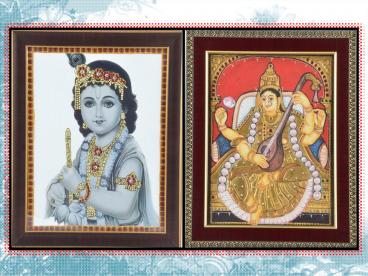Gold Tanjore Painting – Why Are They So Precious - PowerPoint PPT Presentation
Title:
Gold Tanjore Painting – Why Are They So Precious
Description:
Here are many Tanjore paintings that you can choose from – the Saraswati Tanjore Painting, Krishna Tanjore painting and many more. – PowerPoint PPT presentation
Number of Views:40
Title: Gold Tanjore Painting – Why Are They So Precious
1
(No Transcript)
2
Gold Tanjore Painting Why Are They So Precious
3
(No Transcript)
4
- Tanjore painting is a famous type of work of art
that began in South India. These paintings have
been well known from the sixteenth century and
have advanced under the rule of the Chola rulers
and are popular for its utilization of gold. At
the point when the Marathas attacked Tanjore in
Tamil Nadu numerous painters and specialists
moved here and under their lead, this fine art
prospered.
5
(No Transcript)
6
- This type of painting is recognized by its
utilization of gold and semi-valuable or valuable
stones which is utilized to complement the
outline.Each painting recounts a story, more
often than not rotating around Hindu divine
beings, Goddesses or Saints.In long time past
days, Tanjore paintings were put in dull
sanctuary places of worship by rulers. In a
diminish put, the gold used to upgrade the
painting.
7
(No Transcript)
8
How are Tanjore paintings made?
- Tanjore paintings are totally handcrafted and
don't utilize any hardware. To make a Tanjore
painting, an outline is first made on a material.
This material is stuck on a wooden base, truly
produced using the jackfruit tree. Today, plywood
is utilized as an option. The canvas is equitably
covered with Limestone or French chalk and a
coupling medium.
9
- When dry, the portray is sketched out with dim
darker or dark paint and painted utilizing
splendid hues. These paintings have complex brush
strokes and elegant figures. The gold adds life
and profundity to the painting. - Between 2nd century B.C. and 7th century A.D.,
gold in these paintings helped inspire a feeling
of devotion. - In olden days, vegetable or mineral dyes were
used in the painting. The colors used were
specific to different segments of the painting.
10
(No Transcript)
11
- For example1. Backgrounds were usually red
or green. - 2. Lord Vishnu was colored blue and Lord
Nataraja was painted white - 3. The color yellow was used to paint
Goddesses - 4. The sky was painted blue or black depending
on the story - 5. The clothing and ornaments adorned by Gods
and Goddesses were made of pure gold.
12
- Gold, gemstones, pearls, glass dots, and valuable
stones are embellished over the painting. This
gave the paintings a three-dimensional impact.
Normally, gold foils are utilized as a part of
these paintings. Once in a while unadulterated
gold drain or tidy is utilized also. The
utilization of unadulterated gold makes the
painting a breathtaking visual treat. Since gold
was generally utilized, these paintings were
viewed as a fortune. The sparkle of these
paintings goes on for 80-100 years, as
unadulterated gold never blurs.
13
(No Transcript)
14
- There are many Tanjore paintings that you can
choose from the Saraswati Tanjore Painting,
Krishna Tanjore painting and many more. The
most-loved theme by Tanjore painters has been the
image of baby Krishna, sitting on his golden
throne with a pot of butter in his hands. He is
elaborately bejeweled and the painting features
gold in his jewellery, clothing and the throne.
15
(No Transcript)































